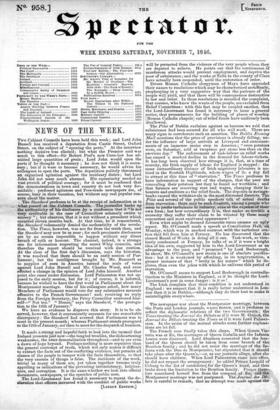NEWS OF THE WEEK.
Two Cabinet Councils have been held this week ; and Lord John Russell has received a deputation from Castle Street, Oxford Street, on the subject of "opening the ports." At the interview nothing decisive was elicited; but what the Premier said was much to this effect—Sir Robert Peel's new Corn-law has ad- mitted large quantities of grain ; Lord John would open the ports if he thought it necessary ; he does not think it is neces- sary ; but if it were to become necessary, he would advise his colleagues to open the ports. The deputation politely threatened an organized agitation against the residuary duties; but Lord John did not seem much alarmed. His equanimity needed no vast stretch of political courage • for it must be confessed that the demonstrations in town and country do not look very for- midable : professed agitators and Free-trade newspapers are, of course, busy in their vocation, but without any real popular con- cern about the matter.
The Standard professes to be at the receipt of information as to what passed at the Cabinet Councils. The journalist backs up the authenticity of his disclosure ,by a confession that it "is not very creditable in the case of Councillors solemnly, sworn to secrecy " • but observes, that it is not without a precedent which occurred eleven months back. At that time, be it remembered, the Standard vehemently denied the authentiCity of the revela- tion. The Times, however, was not far from the truth then, and the Standard may now be as near • for such proximate disclosures are by no means impossible to happen without any direct breach of oath or honour. The channel, indeed, is a strange one for information respecting the secret Whig councils, and therefore the report should be received with due caution. At the close of the first day's discussion, says the historian, it was resolved that there should be an early session of Par- liament; but the intelligence brought by Mr. Bancroft as to supplies of corn in America turned the scale of votes against Lord John Russell and Mr. Charles Wood, and even effected a change in the opinion of Lord John himself. Another point also came under discussion. Lord Palmerston was not op- posed to the early session, but for it ; of course, it is inferred, because he wished to have the first word in Parliament about the Montpensier marriage. One of his colleagues asked, bow many Members of Parliament would vote for any substantive measure offensive to the French Government? and, receiving no reply from the Foreign Secretary, the Privy Councillor answered him- self—" Not ten." " Hence," says the Standard, " the proroga- tion to the 12th of January." We have no evidence to disprove this story. It is to be ob- served, however, that it conveniently accounts for one remarkable discrepancy the Standard had averred that Parliament was to meet in the present month; whereas Parliament stands prorogued to the 12th of January, not then to meet for the despatch of business.


























